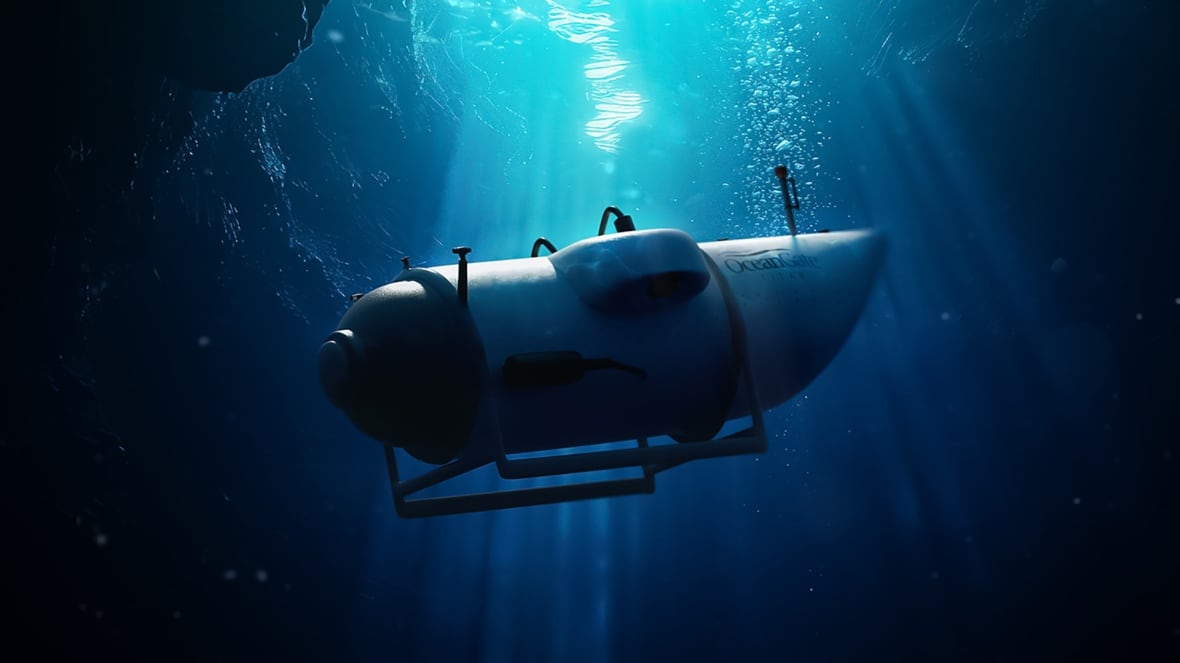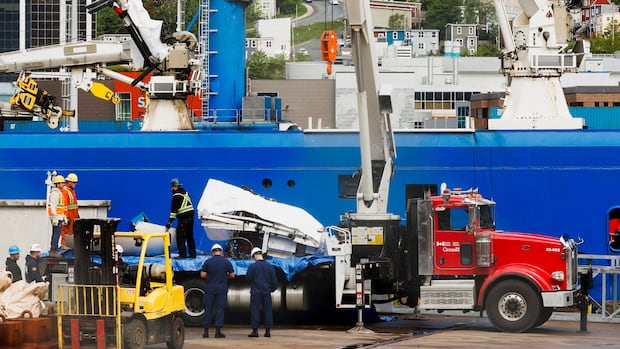U.S. Coast Guard releases damning report on OceanGate, 2 years after fatal Titan implosion
Titan submersible imploded while diving to Titanic wreck site, killing all 5 on board

The United States Coast Guard Marine Board of Investigation has released its final report on the company responsible for operating the Titan submersible, which imploded two years ago while attempting to dive to the wreckage of the Titanic, killing all five people on board.
The report, released on Tuesday, says the board found OceanGate didn't follow engineering protocols for safety, testing or vessel maintenance.
The 335-page document also highlighted problems with how the business operated, its workplace culture and the need to improve regulatory oversight for "manned submersibles and vessels of novel design."
"For several years preceding the incident, OceanGate leveraged intimidation tactics, allowances for scientific operations and the company's favourable reputation to evade regulatory scrutiny," the report reads.
"By strategically creating and exploiting regulatory confusion and oversight challenges, OceanGate was ultimately able to operate Titan completely outside of the established deep-sea protocols, which had historically contributed to a strong safety record for commercial submersibles."
The event prompted an international search and rescue operation, after the Titan lost contact with its support vessel the Polar Prince on June 18, 2023.
It was eventually determined the vessel's hull lost structural integrity and imploded, killing the crew which included OceanGate CEO Stockton Rush, British billionaire explorer Hamish Harding, father and son Shahzada and Suleman Dawood and renowned Titanic researcher Paul-Henri Nargeolet.
"This marine casualty and the loss of five lives was preventable," said Jason Neubauer, Titan MBI chair, in a press release.
"The two-year investigation has identified multiple contributing factors that led to this tragedy, providing valuable lessons learned to prevent a future occurrence. There is a need for stronger oversight and clear options for operators who are exploring new concepts outside of the existing regulatory framework."
'Critically flawed'
The "primary causal factors" for the tragedy were the company failing to address engineering issues, reads the MBI report, and a lack of understanding of how the hull of the vessel would react to the "inherently hazardous environment."
The company also continued to use the Titan after several incidents that compromised the hull's integrity.

The report also listed contributing factors, like OceanGate's "critically flawed" safety culture and operational practices.
"At the core of these failures were glaring disparities between their written safety protocols and their actual practices," the report reads.
"OceanGate's chief executive officer's sustained efforts to misrepresent Titan as indestructible due to unconfirmed safety margins and alleged conformance with advanced engineering principles provided a false sense of safety for passengers and regulators."
The U.S. Coast Guard said there was a "missed opportunity" on the government's part to intervene before the tragedy, pointing to a 2018 OceanGate whistle-blower as well as deficient communication between Occupational Safety and Health Administration and the U.S. Coast Guard on Seaman's Protection Act protocols.
"Early intervention may have resulted in OceanGate pursuing regulatory compliance or abandoning their plans for Titanic expeditions," it said.
Ultimately, the report made 17 recommendations, including establishing an industry working group to review and update the framework to help submersibles achieve safety standards similar to those of surface vessels.
The report also said the U.S. Coast Guard should push for expanded federal requirements so there would be "proper regulatory oversight" for the types of submersibles carrying out oceanographic research operations.
Another recommendation calls for required communication on all submarines and submersibles that conduct commercial or scientific operations, and a new requirement for submersible owners to give notification to local U.S. Coast Guard officers, which would include a dive plan and an emergency response plan.
Download our free CBC News app to sign up for push alerts for CBC Newfoundland and Labrador. Sign up for our daily headlines newsletter here. Click here to visit our landing page.


